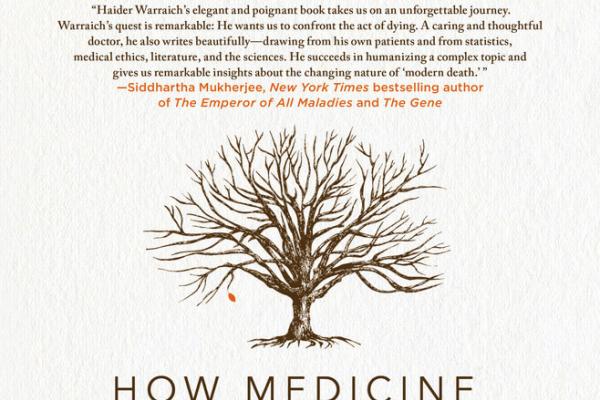SOUTH ASIAN-AMERICANS, such as Siddhartha Mukherjee and Atul Gawande, have recently made a dent in the white male hegemony that has reigned in medical writing for general audiences. Haider Warraich is following in their path with this new book on death and dying.
With liberal use of anecdotes from a medical residency in Boston, Warraich snaps the reader out of sanitized TV portrayals or even hospital experiences of death to induce a more authentic confrontation, one most would seemingly rather avoid at all costs. (Witness church members who no longer have funerals but “celebrations of life” and “homegoings,” often after enduring dehumanizing and futile end-of-life interventions.)
But is lack of knowledge about the mechanics of “modern death” in a technological society at the core of the problem, as Warraich seems to think? Is his thesis correct that our fear of death is greater than ever? Can social media posts by the dying overcome these problems?
After chapters on cell death and trends in longevity, Warraich discusses the institutionalization of death in the 20th century. Over half of Americans now wish for a home death, but 80 percent end up dying in a hospital or nursing home. Most of the poor die in hospital, while the wealthy can choose home or hospice.
Warraich gives a history of CPR and other life support techniques and the evolution in the 1970s of the ethical and legal basis to withhold or withdraw life support, including the slippery concept of “brain death.” Perhaps 90 percent of ICU patients with no hope of recovery can survive for weeks or months without a decision to withdraw life support. Hence Warraich’s chapters on caregivers and families of ICU patients are particularly helpful, especially the sections on family conflict and health care proxies, “one of the hardest things one can be nominated to be.”
I wonder what influence Warraich’s upbringing and medical education in a Muslim society (Pakistan) had on his views about death and dying. He mentions incidents or characters from the Hebrew Bible, not the Quran. He notes that “most patients have great spiritual needs and many derive strength from their faith” but that these needs often are unmet in hospital. Indeed, he devotes the seventh chapter, “When Death Transcends,” to this topic, drawing on a range of disciplines to explore the link of death and religion in America. At the end of life, religious belief brings comfort to many, but it is also associated with more-aggressive care as patients and families pray for a miracle. Spiritual care by the medical team may help the religious forego futile interventions. Yet one study found that only 10 percent of hospital physicians included religion in discussions at the end of life.
Surveys find U.S. doctors more likely to be Jewish, Hindu, or Muslim and less likely to rely on God in decision-making than their patients; religious physicians are less likely to advise withdrawal of treatment. Warraich compares the teachings of the major world religions on care at the end of life. Most Muslims see suffering as purification, reject euthanasia, and grant physicians much authority. Warraich himself seems to advocate avoidance of suffering and endorse physician-assisted suicide, terminal sedation (if not euthanasia), and maximum patient autonomy. He concludes that “not talking about a patient’s faith is tantamount to not treating them as a person.”
Although Warraich’s affirmative answers to my opening questions are not convincing, his book is enlightening. It is extensively referenced and indexed, and it would be especially valuable for clergy and for health-care providers in training, as well as for middle-age and older general readers anticipating decisions regarding the end of their own lives or those of loved ones.

Got something to say about what you're reading? We value your feedback!
